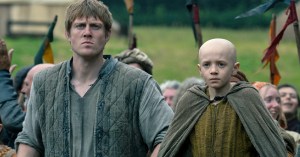Civic Duty‘s Peter Krause Talks TV, Terrorism, and Paranoia
On HBO's "Six Feet Under," Peter Krause played Nate Fisher as an outwardly cool guy haunted by internal demons ...
On HBO’s “Six Feet Under,” Peter Krause played Nate Fisher as an outwardly cool guy haunted by internal demons; in his new film, “Civic Duty,” he plays a man overtaken by them.
While it owes a debt to “Rear Window,” “Civic Duty” explores how post-September 11 paranoia might drive generally responsible citizens to the brink. Krause stars as Terry Allen, a recently sacked accountant who suspects his new downstairs neighbor Gabe (Khaled Abol Naga) may be tied up in terrorist activity.
“Civic Duty” opens Friday in limited release. In a telephone interview, Krause (who also acted as a producer on “Duty”) spoke with Rotten Tomatoes about working in film versus television and living in a culture of fear.
[Warning: Spoilers Below]
Rotten Tomatoes: You seem to have a knack for playing characters that have a veneer of stability, but they’re sort of volcanic underneath. What about that appeals to you?
Peter Krause: I see a lot of behavior like that in the world. I think it’s my job to reflect that. I did a mini-series for the Sci-Fi Channel called “The Lost Room,” and I got to play a classic hero who knows right from wrong and has a clear objective — his daughter’s lost in another dimension and it’s his job to get her back. It was psychologically refreshing to be that uncomplicated.
RT: You’ve done a lot of work on TV. Are movies more limiting in terms of creating a character?
PK: I think so, just because of the amount of time you get to spend with a character. At the same time, I think you can achieve a great deal in a short amount of time. I look back to a film like “Gone with the Wind,” for instance. I think the characters were written so exactly –- there’s no fat on it. [But] I think that you can explore different psyches in greater depth on television, obviously because you have more time.
RT: So was this particular character a challenge, given that “Civic Duty” is 90 minutes?
PK: Oh, very much so. We had to indicate a few things in the beginning about his temperament without giving away the turn of the film when he draws the gun. Cinematically, we wanted to protect that surprise while at the same time having it somewhat grounded in Terry’s earlier behavior in the film. It’s a moment when somebody snaps, and that’s an interesting moment to explore, I think, because the film is dealing with the question of, “Why do people commit random acts of violence?” And it also asks the question, “Are they really random?” I think there is a sort of psychological background from which acts of violence are made manifest.
RT: How did you first get involved with this project?
PT: I was offered the role, and the script was sent to me. I liked the core idea about an average American -– actually, he wasn’t average, he was very conservative in the original draft. I wanted to bring him to the middle and make him an emblem of the silent majority, which I thought would put everybody up on the screen, rather than [have] a conservative citizen be able write the film off and say, “Oh, they’re making fun of me,” or a liberal audience member point their finger and laugh and say, “Look at that crazy conservative guy.” I wanted to make a film that hopefully makes everyone feel included in Terry’s paranoia, even if Terry is an extreme expression of paranoid thoughts. Certainly during those months following September 11, everyone was glued to their television set looking for answers and having their fear reflected, if not amplified, by the mainstream media. Obviously, we can’t exist in that state of mind for very long. It’s just not healthy, and it’s not our nature to remain paranoid like that, as I think is indicated by the shootings at Virginia Tech, and that button is pushed again, and people start wondering, “Am I paying close enough attention to my neighbors, to my neighborhood?” You just can’t live like that.
RT: Was the material a hard sell?
PK: Yes. I know that they tried [to get the film off the ground] for quite a while, a number of actors had been attached and shied away. So long as they were willing to play ball with me, let me come on as a producer and get my hands in there creatively, I was more than happy to take part. Fortunately, [Director] Jeff Renfroe and I shared the same vision for the movie, and [writer] Andrew Joiner, very graciously, was willing to sit down and work with us and rewrite the script. I think what we came up with is a very interesting film that asks a lot of questions and even provides something of value to the audience. Hopefully it will inspire people to think a little bit about how we can behave differently so as to not promote random acts of violence.
[Spoiler Alert!]
RT: You had some input on the ending — you wanted to make it more ambiguous?
PK: Originally, the shock was, all along, everyone in the audience is going to think Terry’s crazy, and then, bam! At the end, Gabe is indeed a terrorist. It isn’t the realm of possibility or reality. But, I didn’t think, nor did Jeff think, that it was a responsible artistic choice to amplify or magnify the paranoia people feel. I think that we would have been asking people to be more paranoid, to be more vigilant to watch their neighbors. I just don’t think the answer is to be more paranoid. We have a greater capacity for joy than living a life where we’re constantly in fear.
[Spoilers Over]
RT: There have been a lot of movies lately, from “Disturbia” to “Red Road,” and now “Civic Duty,” that seem to derive their central premises from “Rear Window,” with people spying on each other. What is it about our current political climate that’s made people want to tell these stories?
PK: I think that fear sells and that people are buying it. I don’t want to sound like a simple economist here, but I do when I say that. I think at first, the media was behaving responsibly post-September 11. People wanted answers. People wanted to have an idea of, “What kind of world am I living in?” and their fears were reflected at first that there were perhaps thousands of terrorists embedded in the country. And I think after a while, with ratings, and the way corporate America works, that the networks and the cable news networks recognized what they’ve known for a long time, and that’s that fear does sell. There was a reason why we all were buying into it at first, and now it’s become more than a mere inconvenience at an airport; it really is more about the psychological state or the emotional state of much of America. You reach a breaking point where you just can’t live like that. You have to let it go. I do think there’s a point where corporate ethics have to be questioned about selling fear, and at the same time, if we’re continuing to buy it, we’re driving the creation of every weekend’s horror film. And I’ll be honest, part of what makes “Civic Duty” work is that it is a horror film, and it’s a particularly disturbing horror film because it could be true.
RT: Right. We’re talking about the politics of the film, but there are elements of suspense that make it work as a thriller, in addition to being politically provocative.
PK: Yeah. You need a delivery system for the provocative political stuff. Our delivery system is a psychological suspense/thriller. And I don’t think we’re cheating the politics by doing that. In some ways we streamlined it to be as commercial as possible while providing as much provocative political content as possible. If you make a film that would only play in an arthouse, then it’s just going to only play in an arthouse, and the people who already think a certain way are going to see it. We were trying to reach out a little beyond that.
RT: Switching gears, what’s up with “Dirty Sexy Money”?
PK: “Dirty Sexy Money” is a TV pilot for ABC that Craig Wright, who was a writer on “Six Feet Under,” wrote. I said no to it several times; I didn’t want to go back to TV because of the grind. But what Craig is trying to do with “Dirty Sexy Money” is sort of a reinvention of the wheel. It’s like “Dallas,” “Knots Landing,” “Dynasty,” but with a special kind of twist. It’s definitely set in a post-September 11 world, and it’s both comic and tragic.
RT: Do you want to expand into more movie roles?
PK: I would like to. I’d like to do some more comedy. At the same time, I do feel responsible to do what I can to see movies like “Civic Duty” get made, because I think they do provide a jumping-off point to have conversations with others and examine the world that we live in and not run away from it. There’s a place for pure entertainment in the world, and I think there’s also a place for entertainment that is provocative.
RT: “Civic Duty” was your first film production. Are you reading more scripts now?
PK: I’m reading some more scripts, and I’m working on a few other projects. I have a writer friend who’s working on a script that’s half a swindle movie and half a boxing movie. It’s kinda like “The Sting” meets “Rocky.” I play a former boxer. We’re trying to get that made.
RT: Finally, were you sad to be done with “Six Feet Under?”
PK: That was a really special show. At the time, myself and a few others were a little shocked and dismayed that we were only going to do five seasons. But when I look back now at what [creator] Alan [Ball] was doing, and the great theme of the show that we all die, so get to work on the life you want to be leading, and start doing it now.







